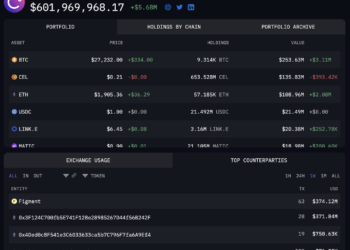Bitcoin (BTC) was lower, hovering around $32,000 for a fourth straight day.
A break above $35,000 could mark a “potential trend reversal, giving hope to the bulls,” the Norwegian cryptocurrency-analysis firm Arcane Research told clients Tuesday in a report. “A break of the $30K support will probably see the price fall down to the $26K-$27K area.”
U.S. stock futures fluctuated after congressional leaders said passage of President Joe Biden’s proposed $1.9 trillion relief package might not happen until mid-March. Gold weakened 0.3% to $1,850 an ounce.
Market moves
The roster of cryptocurrency buyers keeps expanding, with endowment funds for some of the most prestigious U.S. universities now reportedly nosing in.
Funds for Harvard, Yale, Brown and the University of Michigan have quietly been buying cryptocurrency for the past year or so through accounts held at Coinbase, CoinDesk’s Ian Allison reported Monday, citing two sources familiar with the situation. Harvard has the largest university endowment of any with over $40 billion in assets, and Yale is close behind with more than $30 billion.
It’s a key development because digital-market analysts say growing interest from big institutional buyers has been a major factor in bitcoin’s quadrupling in price last year, with another 11% gain just in January alone.
While the university allocations likely represent a fraction of a percent of their total assets, the news reveals yet another potential source of demand for bitcoin and other cryptocurrencies at a time when corporations and money managers such as BlackRock and Fidelity have been lapping it up.
Based on the most recent data from the U.S. Education Department’s National Center for Education Statistics, U.S. university and college endowments had assets with a market value of about $600 billion as of 2017.
As First Mover has discussed previously, the corporate treasuries of companies in the Standard & Poor’s 500 Index of large U.S. stocks represent a $2.3 trillion money pot of cash and short-term investments that could conceivably be at least partially allocated to bitcoin or other cryptocurrencies.
And just since October when Square, the payments company helmed by Twitter CEO Jack Dorsey, announced it would put some $50 million, or 1% of its assets, into bitcoin, the number of corporate treasurers and fund managers following suit has expanded rapidly.
At that time, according to the handy website bitcointreasuries.org, there were just 60,927 BTC in corporate treasuries and professionally managed funds, valued at $619 million. The amount has since swelled to 1.22 million bitcoin valued at about $39.7 billion.
The developments keep coming:
- Marathon Patent Group, a bitcoin mining company, disclosed Monday it bought $150 million of bitcoin for about $31,100 apiece during the cryptocurrency’s recent rout. As reported by CoinDesk’s Danny Nelson, the Nasdaq-listed firm said it bought the cache through the digital-asset manager NYDIG.
- CoinShares, the digital-asset manager, reported Monday its weekly tally of inflows into cryptocurrency investment products hit a record $1.3 billion last week. The recent price weakness in bitcoin “looks to have been a buying opportunity,” according to the firm.
- Rothschild Investment Corp., a Chicago-based money manager of $1.4 billion, disclosed Monday t had nearly $1 million of shares as of year-end 2020 in Grayscale Bitcoin Trust (GBTC), run by the CoinDesk sister company.
- ARK Investment Management CEO Cathie Wood, an exchange-traded fund magnate and outspoken bitcoin advocate, said in a Jan. 23 interview with Yahoo Finance that large companies have asked her if they should invest in bitcoin as an inflation-hedging strategy. “I think we’re going to hear about more companies putting this hedge on their balance sheet,” she said.
And it’s apparently not just bitcoin these big players are after. As reported Monday by CoinDesk’s Muyao Shen, there are indications the recent rally in ether (ETH), the native cryptocurrency of the Ethereum blockchain, has been fueled in part by institutional buying.
Some of them are even dipping into the exotic, fast-growing and often risky arena of decentralized finance, known as DeFi – an interlocking array of semi-automated trading and lending platforms that entrepreneurs, coders and even hobbyists are assembling with blockchain technology and open-source software.
“The more adventurous institutions are exploring Ethereum and DeFi after they looked at bitcoin,” Arthur Cheong, founder and portfolio manager at DeFi-focused crypto fund DeFiance Capital, told Shen.
With the smartest money – literally – now buying cryptocurrencies, it’s hard to imagine more institutional players won’t follow. (We’re looking at you, pension funds with $4 trillion.)
“I’d imagine there are a few big names we don’t yet know of currently buying up bitcoin,” said Chris Thomas, head of digital asset for Swissquote Bank, as reported Monday by CoinDesk’s Daniel Cawrey. “We’ll likely discover them very soon, by which point they will have accumulated quite substantial volumes.”
– Bradley Keoun
Bitcoin watch

Bitcoin options worth $4 billion are set to expire on Friday, potentially exacerbating price swings as January draws to a close.
Some 120,300 contracts are due for expiration on Friday on major exchanges Deribit, CME, Bakkt, OKEx, LedgerX, according to the data provider Skew.
Much of that amount can be found on Deribit, the world’s largest crypto options exchange by trading volume: It’s on track for a record monthly bitcoin options expiry of 102,162 contracts (nearly $3.5 billion).
At current price levels, more than 80% of the options open interest would expire out-of-the-money, or worthless. But if the bitcoin market starts moving in the next few days, big players might be forced into new hedging transactions, which could give rise to more significant price turbulence.
“If BTC rapidly jumps to all-time highs within the next few days, it’s expected market makers will aggressively hedge their out-of-the-money short call option exposures, which would likely increase overall market volatility and momentum in the underlying price,” Samneet Chepal, quantitative analyst at the quantitative and systematic digital asset investment firm Ledger Prime, told CoinDesk.
– Omkar Godbole
Token Watch
Ethereum (ETH): Balances on crypto exchanges fall to 15-month low of 15.4M ETH, in positive sign for price (Decrypt)
XRP (XRP): Ripple lawyers hope to engage with Gary Gensler on U.S. SEC suit, assuming he’s confirmed as the securities regulator’s new chair (WSJ)
What’s hot
Collateralized debt obligations make their way onto DeFi lending (CoinDesk)
It’s ‘frothy squared’ as crypto firms line up for IPOs to tap market mania (Bloomberg)
Novogratz’s Galaxy Digital to launch Ethereum funds (Decrypt)
Winklevosses’ Gemini exchange adds local currency, DeFi tokens in Singapore expansion (CoinDesk)
Shariah-compliant crypto exchange wins license from Bahrain’s central bank (CoinDesk)
Market value of DeFi tokens surges to $45B, triple the amount at end of October (Decrypt, CoinGecko)
Analogs
The latest on the economy and traditional finance
Small-investor stock-trading activity on Robinhood, Charles Schwab and Morgan Stanley’s online brokerage shows no sign of slowing (WSJ)
GameStop short-sellers reload bets after $6B loss (Bloomberg)
World’s largest movie-theater chain, AMC, nets $917M in financing to ward off bankruptcy (WSJ)
“With the U.S. increasingly reliant on foreign capital to compensate for its growing shortfall of domestic saving and with the [Federal Reserve’s] open-ended quantitative easing measures creating a massive overhang of excess liquidity, the case for a sharp further weakening of the dollar looks more compelling than ever,” former Morgan Stanley Chief Economist Stephen Roach writes in op-ed. (Bloomberg Opinion)
Billionaire investor Warren Buffett, who famously said last year that bitcoin had “no value” before its price quadrupled, is now struggling with his investment firm Berkshire Hathaway’s stakes in Japanese trading companies focused on energy and mining. (WSJ)
Tweet of the day

Credit: Source link









































































































































